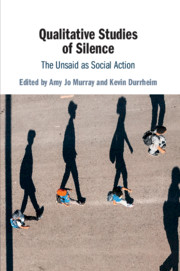Book contents
- Qualitative Studies of Silence
- Qualitative Studies of Silence
- Copyright page
- Dedication
- Contents
- Figures
- Contributors
- Acknowledgments
- Introduction: A Turn to Silence
- 1 Literal and Metaphorical Silences in Rhetoric: Examples from the Celebration of the 1974 Revolution in the Portuguese Parliament
- 2 Seeing Silenced Agendas in Medical Interaction: A Conversation Analytic Case Study
- 3 Listening to the Sound of Silence: Methodological Reflections on Studying the Unsaid
- 4 Social Silences: Conducting Ethnographic Research on Racism in the Americas
- 5 Intimate Silences and Inequality: Noticing the Unsaid through Triangulation
- 6 Silence in the Court: Moral Exclusion at the Intersection of Disability, Race, Sexuality, and Methodology
- 7 Silencing Self and Other through Autobiographical Narratives
- 8 Gendering the Unsaid and the Unsayable
- 9 The Language Ideology of Silence and Silencing in Public Discourse
- 10 Propaganda by Omission: The Case of Topical Silence
- 11 Silencing Whistleblowers
- 12 Between Sound and Silence: The Inaudible and the Unsayable in the History of the First World War
- 13 Affect and the Unsaid: Silences, Impasses, and Testimonies to Trauma
- 14 The Unsaid and the Unheard
- 15 Conclusion: Topographies of the Said and Unsaid
- Index
- References
1 - Literal and Metaphorical Silences in Rhetoric: Examples from the Celebration of the 1974 Revolution in the Portuguese Parliament
Published online by Cambridge University Press: 30 June 2019
- Qualitative Studies of Silence
- Qualitative Studies of Silence
- Copyright page
- Dedication
- Contents
- Figures
- Contributors
- Acknowledgments
- Introduction: A Turn to Silence
- 1 Literal and Metaphorical Silences in Rhetoric: Examples from the Celebration of the 1974 Revolution in the Portuguese Parliament
- 2 Seeing Silenced Agendas in Medical Interaction: A Conversation Analytic Case Study
- 3 Listening to the Sound of Silence: Methodological Reflections on Studying the Unsaid
- 4 Social Silences: Conducting Ethnographic Research on Racism in the Americas
- 5 Intimate Silences and Inequality: Noticing the Unsaid through Triangulation
- 6 Silence in the Court: Moral Exclusion at the Intersection of Disability, Race, Sexuality, and Methodology
- 7 Silencing Self and Other through Autobiographical Narratives
- 8 Gendering the Unsaid and the Unsayable
- 9 The Language Ideology of Silence and Silencing in Public Discourse
- 10 Propaganda by Omission: The Case of Topical Silence
- 11 Silencing Whistleblowers
- 12 Between Sound and Silence: The Inaudible and the Unsayable in the History of the First World War
- 13 Affect and the Unsaid: Silences, Impasses, and Testimonies to Trauma
- 14 The Unsaid and the Unheard
- 15 Conclusion: Topographies of the Said and Unsaid
- Index
- References
Summary
This chapter examines significant silences in a specific situation: namely, the Portuguese parliament’s annual commemoration of the April 1974 revolution that overthrew the Salazarist dictatorship. By concentrating on a formal occasion of epideictic rhetoric, it is possible to examine rhetorical silences in detail. The analysis makes two crucial distinctions: the differences between literal and metaphorical silences and the differences between absences produced by speakers and those produced by audiences. The analysis concentrates on absences in the ways that the right-wing parties participate in the ceremony. The right-wing parties, especially the CDS-PP, are ambivalent about the 1974 revolution and its symbol of the red carnation. However, this ambivalence cannot be expressed directly in the ceremony but is revealed in absences – whether it be speakers avoiding giving unqualified praise of the revolution or unmitigated criticism of Salazarism, or the audience withholding applause at specific moments, or audience and speakers not wearing the symbolic carnation. The absences, which need not be literal silences, can be subtly managed. One example shows how a CDS-PP speaker rhetorically creates a space for right wingers to applaud the mention of the postrevolutionary defeat of the far left, while not rhetorically creating an analogous space for applauding the revolution itself.
- Type
- Chapter
- Information
- Qualitative Studies of SilenceThe Unsaid as Social Action, pp. 21 - 37Publisher: Cambridge University PressPrint publication year: 2019
References
- 5
- Cited by

